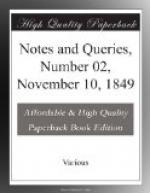I may take the liberty of adding here a mention of Skelton which escaped notice, and which is from one of the tracts against Thomas Nash, produced by Gabriel Harvey, the friend of Spenser. He couples Skelton and Scoggin together, in no very respectful manner, and completes the triumvirate by Nash, whom he here calls Signor Capriccio:—“And what riott so pestiferous as that which in sugred baites presenteth most poisonous hookes? Sir Skelton and Master Scoggin were but innocents to Signior Capricio.”
This quotation is the more noticeable, because it recognises the sacred character of Skelton (however unworthy of the gown) in the prefix “Sir,” which, as most people are aware, was then generally given to clergymen: Scoggin, on the other hand, is only styled “Master Scoggin.”
J. Payne Collier.
[The preceding communication was already in type when we received the following from Mr. Bolton Corney, which we gladly print, inasmuch as it illustrates some points not touched upon by Mr. Collier.]
* * * * *
Queries answered, no. 1.
It is not without some slight reluctance that I notice anonymous communications, but shall endeavour to repress such feelings with regard to the modest students who may choose to announce their desiderata through the convenient channel of the “Notes and queries.” A hearty well wisher to so commendable an enterprise, shall have my first responsive scrap.
The inquiry affords no scope for ingenuity of conjecture! The foolish rime to which bishop Aylmer refers, is undoubtedly the pamphlet thus entitled:—
“A Skeltonicall salutation,
Or condigne gratulation,
And iust vexation
Of the Spanish nation,
That in a bravado
Spent many a crusado,
In setting forth an armado
England to invado.”
Oxford, Joseph
Barnes, 1589. 4to.
“A Skeltonicall salutation,”
&c.
Imprinted at London for Toby
Cook, 1589. 4to.
The Oxford edition is recorded by Ames, and there is a copy of the London edition in the British Museum. Strype, in his account of bishop Aylmer, gives the substance of the letter as his own narrative, almost verbatim—but fails to identify the pamphlet in question. Park briefly describes it in Censura Literaria, 1815, ii. 18.; and there is a specimen of it in The Poetical Works of John Skelton, as edited by the Reverend Alexander Dyce, 1843.
While queries evince a sharp mental appetite, answers help to satisfy it; and so, by their united influence, a brisk circulation of ideas may be produced—which, as master Burton assures us, wards off melancholy.
BOLTON CORNEY.
* * * * *
NOTES UPON “NOTES, NO. 1.”
Sir,—I take the liberty to send you one or two Notes on your first Number, just as they occur to me in looking it over. I will not trespass on you by preface or apology.




